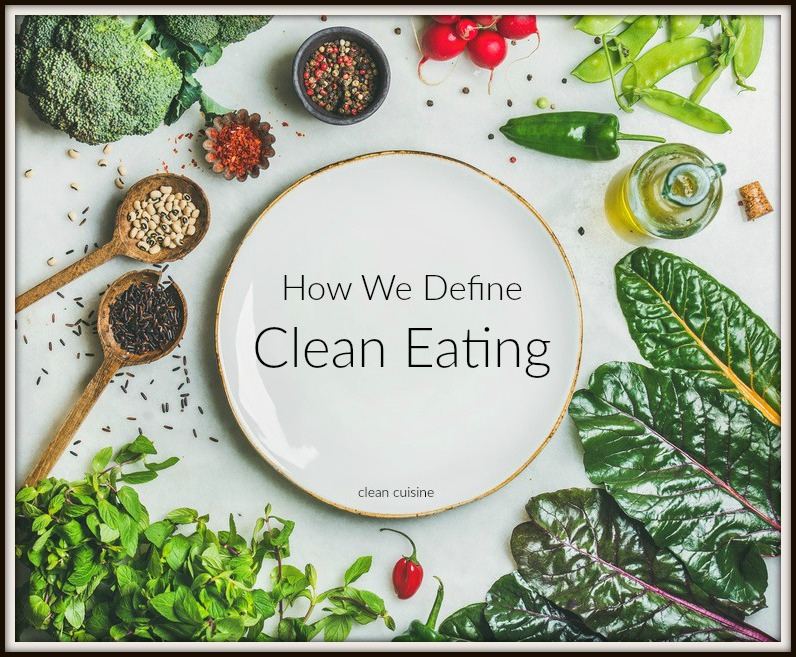
Our Why
Our family has been eating clean since 1998, long before it was the “in” thing to do (you can read my 19-year diet journey HERE.) It is important to understand that we started our research into clean eating and whole foods nutrition after my diagnosis with multiple sclerosis (MS) in 1998. My neurologist at the University of Miami suggested that an anti-inflammatory diet could potentially help slow the progression of my disease. I had no idea what an anti-inflammatory diet was and my doctor didn’t have all day to sit tell me about it. Diet books definitely existed (the “Protein Power” book and “Atkins” were both very popular) but the internet was in it’s infancy and there certainly were no such thing as blogs back then. You were more or less on your own to sort it all out.
I most definitely did not have any training in nutrition nor did I even have the background to evaluate nutrition research. I was lucky my husband, Andy Larson, M.D., was finishing medical school at the University of Pennsylvania at this time and I was lucky that he did have the training to analyze research. Like most doctors, Andy’s nutrition training in medical school was minimal, but he had an open mind and he greatly respected my neurologist, a professor at University of Miami. I very seriously doubt we would have started researching nutrition at all had it not been for my neurologist’s recommendation.
But our nutrition research was not done based on recommendations in popular diet books or blogs. We researched nutrition studies that were done in medical journals. I would have never been able to do this without my husband’s help because I didn’t know, for example, that a study done on a mouse was not the same quality as a study done on a real person (I know now though!) While medical schools still do a rather poor job teaching nutrition the good ones are very strong at teaching young doctors how to evaluate research.
And so with my husband’s help, we created an anti-inflammatory clean eating diet that was intended to help slow the progression of my disease. We brought our program to the public and tested it on real people with a wide variety of inflammatory conditions and we got some pretty amazing results (the number one “side benefit” was weight loss.) We published our first nutrition book in 2005 (it was #1 on Amazon!) and we published our fourth book, Clean Cuisine: An 8-Week Anti-Inflammatory Nutrition Program that Will Change the Way You Age, Look & Feel in 2013 (I’m working on the follow up Clean Cuisine cookbook now.) So far this way of eating has worked for me, I have never needed to take any of the disease-modifying MS medications and I have not had another MS exacerbation since 1998. Multiple sclerosis is a disease that is made worse by inflammation and this way of eating has kept my inflammation under control for almost two decades. It has also kept me at the same weight since I started. I have raised my son to eat this same way and at almost 17-years old I believe his clean diet is the reason he has only been on antibiotics once in his life.
But gosh, what I follow and what has worked for me and my family is not nearly as complicated or restrictive as the clean eating diets I see out there today. To be honest, I just don’t know if I could have stuck to it for this long if it was.
Ok, so that’s our family’s reason for starting, but here’s what our clean eating definition is…
What Clean Eating Means to Us….
What Is Clean Food?
To us, clean food means unprocessed, unadulterated, and natural. No dirty chemicals nor additives that are not found in food in the wild as it grows or feeds. Clean food provides the nourishment people have spent hundreds of thousands of years growing accustomed to eating. It is food is in harmony with nature and in harmony with our bodies’ needs. Clean food might be prepared elaborately yet clean food could simply be the apple plucked from a tree.
What Is Cuisine?
Cuisine on the other hand is always imaginative, delicious and inspired. Cuisine is food you would be proud to serve your family and friends. Cuisine tastes good. In our books and on our blog, we combine clean with cuisine to create recipes that taste good and are good for you. Not just sort of good for you. Clean Cuisine recipes are incredibly nutritious. They are recipes you can feel good about feeding to your entire family. And they are recipes that even the kids will eat (and like!)
What is Clean Cuisine?
Although the concept of “clean eating” is a bit of a mega trend at the moment, if you ask a “clean eater” to define clean eating you’ll get a number of very different answers. Our definition of clean eating does not fit into any of the popular diet categories. It’s not plant-based, vegetarian, paleo, low-fat, raw, keto, grain free, macrobiotic, etc.
Instead of explaining Clean Cuisine based on what foods are eliminated (there aren’t very many, by the way!), we prefer to help you understand our goal in eating this way. In a nutshell, Clean Cuisine is designed to do two things:
- Reduce inflammation
- Optimize nutrition
Our Clean Eating Definition
If we had to define Clean Cuisine in one sentence it would be:
Clean eating is a plant-rich diet based on a wide variety of anti-inflammatory whole foods packaged in their most natural and nutrient-rich state.
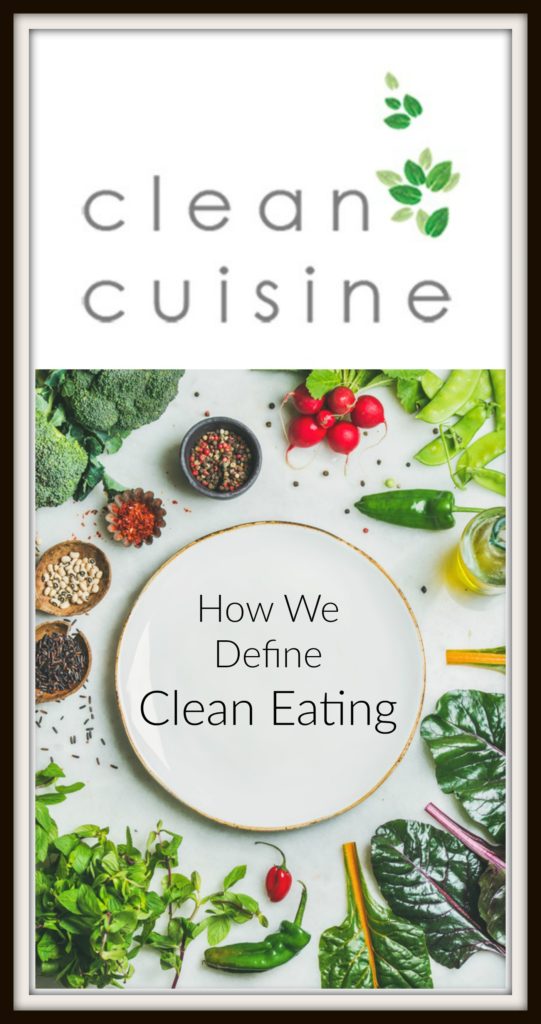
There are MANY Good Foods
We are lucky to live in a time when nutritionists and chefs now fully agree on the value of eating and enjoying real whole foods from ancient grains to healthful fats and even the occasional glass of wine. Clean eating and healthful eating are one and the same. In all of our books and on the blog we take great pride in making clean eating taste delicious and we take great pride in letting our readers choose from as many great tasting foods as possible. No “whole” foods are eliminated unless there is a very good reason for it. Our rules are simple. How about “ALL fruits are ok to eat”? Sure beats weighing the plate, counting calories, and ranking oranges against bananas!
Speaking of calories we do not count them. The science is complicated but it is now known to be fact that calories are not equal in terms of either overall health or the actual amount of energy absorbed by your body or your tendency to gain weight. Our motto dating back to the publication of our first book in 2005 has always been: “Don’t count your food make your food count!” We always encourage people to eat more of the good foods as they will then naturally eat less of the bad foods. And there are SO so many good foods to choose from.
Over the last two decades we have collected hundreds of nutrition books in our home library; other ways of eating outlined in diet books might accomplish most of what Clean Cuisine offers nutritionally but no way of eating is more lenient and no way of eating lets you love life more. Because of my personal health crisis back in 1998, we have looked closely at the nutrition science literature and we base our Clean Cuisine way of eating on studies that have been done on real people. Our books are filled to the brim with references to high quality research (not research done on monkeys!) We’ve also looked closely at how the world’s healthiest and longest-lived people eat. Once you start piecing the pieces of the diet puzzle together, you come up with a way of eating that really is incredibly variety rich. Most importantly, it’s also easy and enjoyable. And isn’t that what life is all about —feeling good and enjoying yourself!
CLEAN CUISINE = MORE PLANTS, LESS ANIMAL FOOD
In general, Clean Cuisine favors plant foods over animal foods. That having been said most animal foods can be enjoyed in reasonable portions. While almost all non-processed plant foods are great for your health (of course we are mindful of and respect the fact some people have allergies and food intolerances) many animal foods have been shown to be less than perfectly healthful, especially if they are consumed in excess.
And if you are strictly talking about eating the “cleanest” foods then it’s important to remember that every step you climb up the food chain ladder, there is a greater chance of accumulating and concentrating toxins found in the environment; toxic overload can tip the body’s balance toward inflammation, illness, weight gain and accelerated aging. While it would be ideal to eat 100 percent organic foods, if this is not possible, and it usually isn’t, it’s important to know you will always get far fewer toxins choosing non-organic “whole” plant foods over the cleanest certified organic animal foods.
Unrefined “whole” plant foods are also the only source of anti-inflammatory phytonutrients and gut-healthy fiber. Both phytonutrients and fiber play a key role in the many overlapping health benefits obtained from eating Clean Cuisine.
- Phytonutrients are substances that protect the plant and fortify it against illness, but they also offer invaluable disease protection and anti-inflammatory benefits to YOU, the plant-eater. Phytonutrients act in a myriad of health-promoting ways. Many phytonutrients are sources of natural anti-aging antioxidants and others act as powerful inflammation extinguishers. Some phytonutrients enhance immune function and promote healing. Others stimulate enzymes that detoxify cancer-causing carcinogens. In a nutshell, the more phytonutrients you can manage to get into your diet, the better!
- Fiber is the indigestible part of plant cells found in fruits, vegetables, whole grains, nuts, seeds, and beans. Fiber acts in a myriad of ways to promote good health and decrease inflammation. It’s also a key component of maintaining a healthy weight without feeling hungry. Fiber is nature’s detoxifier, working to safely and effectively flush toxins from the body. It helps slow digestion so that nutrients can be absorbed more evenly and slowly. And it plays a critical role in keeping our colon healthy and promoting gut health.
The only way possible to get more phytonutrients and fiber in your diet is to eat more plants and less animal foods. There’s just no way around it. Thus, Clean Cuisine places a heavy emphasis on plant-based nutrition.
Side Note…..
OPTIMIZING GOOD GUT BACTERIA
It’s become increasingly well-known that the composition of your gut bacteria likely influences your risk for many health problems, from obesity and type-2 diabetes and even certain autoimmune diseases. Scientists are hard at work trying to determine how and why that’s the case, as well as which bacteria are beneficial—and how to protect them. But research now points to growing evidence that meat and dairy foods negatively affect our gut bacteria while fiber from plant foods acts as a critical gut-nourishing nutrient.
According to a Harvard University scientists’ report in the journal Nature, a diet full of meat and dairy foods alters the gut microbiome in a negative way and, most concerning, it does so more or less immediately after eating. One particular type of bacterium that thrive in a red meat-laden diet is Bilophila, which has been linked to inflammation and intestinal diseases.
Fiber, on the other hand, has long been linked to better health, but new research shows how the gut microbiota might play a key role in this pattern. One study discovered that adding more fiber to the diet can trigger a shift from a gut-bacteria profile linked to obesity to one correlated with a leaner physique. Losing body fat has a rippling positive effect on overall health including decreased whole body inflammation, lower blood pressure, decreased risk of cancer (especially hormone sensitive cancers such as breast cancer), improved hormonal balance, etc.
We also know simply adding more fiber-rich foods to your diet can directly decrease inflammation. Your gut microbes feed on fiber and produce short-chain fatty acids, which get absorbed into the bloodstream. These short chain fatty acids help to regulate the immune system and tamper down inflammation. What this means is that if you are not eating enough dietary fiber, your immune system may be existing in a constant pro-inflammatory state.
But you can’t just load up on fiber-fortified processed foods and call it a day. Studies done on single fibers, such as the inulin added to processed foods, have not shown the same beneficial effects as the fiber that occurs naturally in whole foods. Your gut loves diversity and eating a wide variety of plant-based whole foods is the best way to give your gut the fiber diversity it needs to promote more good bacteria and less bad bacteria.
Keep in mind, the more animal foods you eat, the less room you have for fiber-rich foods.
Clean Cuisine is Not Vegan
Having given such praise to phytonutrient and fiber-rich plant foods, now would be a good time to once again state that we are neither vegans nor vegetarians. Instead, we take advantage of the fact that plant strong diets are more nutrient-dense than animal rich diets especially when looked at on a per calorie basis.
We don’t eat animal foods so much for the protein they provide because we know we can get the protein we need from plant foods, assuming we eat enough calories and enough variety. Instead, we eat animal foods because we like their taste and because animal foods contain certain nutrients that are difficult to get in adequate amounts from plant foods. Nutritional supplements are an option for strict vegans, but it is best to use supplements as just that, supplements. It is always far better to get the nutrients your body needs from whole foods.
Furthermore, even though studies do show that “whole food” vegetarians have fewer heart attacks, less incidence of cancer, less obesity, lower weight, less high blood pressure, and longer life spans in general, if you dig deep into the research you’ll see even those who are not super strict at avoiding animal foods enjoyed equally impressive health benefits across the board, as long as the bulk of their calories came from unrefined whole plant foods with plenty of fruits and vegetables. Also, when we look closely at the research we cannot find scientific evidence to support health reasons for anybody eliminating fish from their diets.
The take-home message here is that science supports that you can reap the health and weight loss benefits of a vegan diet without being 100 percent vegan. Even Colin Campbell, Ph.D—one of the biggest champions of vegan diets in the medical community, co-author of the New York Times bestselling book The China Study ––states in his book that it has not been proven that a zero animal food diet is best. We agree, it has not been proven. We would go further as to say we believe a slightly less than vegan diet, one that contains omega-3 rich seafood is the most healthful.
Our goal with Clean Cuisine is not to set the bar for dietary purity so high that it guarantees failure; instead we want to help you learn to eat and cook in a way that is doable and enjoyable for the long haul. Less than 0.5 percent of the population is vegan, meaning they eat no animal foods whatsoever; you don’t need to go to those extremes to improve your health.
We talk more about why we are not vegan HERE and discuss vegan diets in more detail HERE.
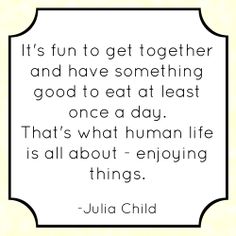 Let’s Get Real
Let’s Get Real
The only way you will reap the benefits of clean eating is if you actually do it consistently.
Both me and my husband are very motivated people when it comes to healthy eating but even we would be unable to follow an unnecessarily austere diet program. We feel firmly that a diet cannot be overly strict or people just won’t do it, and therefore it won’t work. What we have done with Clean Cuisine is taken all of the available research and put together a way of eating and cooking that is enjoyable and effective.
Could you adopt a more extreme way of eating? Sure thing!
Will doing so substantially improve your health or energy? Based on all the available science, that’s highly doubtful.
Our primary goal is life-enhancement; we want to enjoy our life maximally in every way possible. Clean Cuisine is strict when and where it counts most and lenient where it doesn’t matter so much. It’s a balanced way of eating that will absolutely not decrease the pleasure in your life. We even incorporate coffee and wine and we will show you how to prepare and enjoy unprocessed, delicious sweets for dessert.
Make it Simple
The closer a food is to its natural state, the healthier it will be. This means you want to choose whole foods that are unadulterated…just the way nature intended. You want to go for corn instead of corn flakes, steel cut oats instead of a granola bar that is “made with oats” (but also made with a bunch of junk like high fructose corn syrup, processed corn oil, etc.) If push came to shove, you would even want to choose whole olives over olive oil (read more about why “whole” fats from plants are best HERE.)
But we don’t try to micromanage macronutrient ratios. By that, we mean we are not going to tell you that your diet must be precisely X percent fat, Y percent carbohydrate and Z percent protein. In ancient times thousands of cultures flourished. Some had access to lots of fat and some mostly to carbohydrates. All of them managed to enjoy good health in harmony with their environment and all of them largely avoided modern chronic illnesses like diabetes and heart artery disease. When you look at places around the globe where the healthiest and longest-lived people live today, called blue zones, the diet habits of the people are varied but they do have definite similarities. For one thing, the diets are very rich in unrefined “whole” plant foods and low on meat, sugar, animal fat and the toxic processed foods of modern civilization.
Keep in mind Clean Cuisine is all about choice and leniency. And LOTS of variety. Some Paleolithic persons ate one way while others ate another way. In our books (and in our upcoming cookbook) unless there is scientific proof you are harming yourself by eating a particular food or by preparing your food a certain way we’re going to let you make the call. The one exception is if you have a definite food allergy or food sensitivity. Strawberries for example might be brimming with nutrients, but if you are allergic to them then they are going to create an inflammatory response for your particular body. Everyone is different and not everyone can tolerate the exact same foods. But for the most part, clean eating does not need to be nearly as complicated as people have made it today. If you simply focus on consistently eating a wide variety of nutrient-rich whole foods (mostly plants!) and get rid of the processed stuff you will be amazed at how much better you will feel. The key is consistency .
2 Important Clean Cuisine Principles
Clean Cuisine is designed to fight inflammation and to be both nutrient dense and satisfying. Let’s discuss these two points more….
- Inflammation is the tendency of your body to attack itself. There are many modern illnesses that are made much more symptomatic due to inflammation. Autoimmune diseases such as rheumatoid arthritis and multiple sclerosis become more symptomatic when there is more inflammation in your body. Any disease related to the quality of your blood flow through your vessels is also affected by inflammation. These would include the heart artery disease that causes heart attacks and the brain artery disease that causes ischemic strokes and is largely responsible for senility.
- Nutrient density is also very important. Your body craves nutrition. It does not crave a certain number of calories. If the foods you are eating are empty calorie foods (most processed foods such as potato chips contain minimal essential nutrients and are therefore defined as empty) your body will continue to crave more food because it has not yet received the nutrients it needs to keep you healthy and alive. Regularly eating foods without nutrients will lead to obesity which significantly increases your risk for diabetes and cancer. What is more, because fat cells themselves create more inflammation regularly eating foods without nutrients not only increases your risk for obesity but increases your risk for any disease related to inflammation. Nutrient dense foods make you feel more full and offer hunger free weight loss as a side benefit.
Food Matters
While many lifestyle choices affect our health, our diets are most important. Science shows the way you eat reinforces good health on a daily basis even more so than the type of exercise you do and the stress around us. All of these things are important and we talk about controlling stress and functional fitness extensively on our blog but if you have to start somewhere start with your food. With less inflammation circulating and less excess weight to carry around you will be amazed how much less stress you feel and how much easier and more enjoyable it is to exercise. We believe that eating delicious food is easier to do than controlling all the stress around us and easier to stay on top of than regular exercise so let’s start with our plates!
The Clean Cuisine Food Pyramid

We know many people love visuals, so we’ve created the Clean Cuisine food pyramid (which appears on page 11 of our Clean Cuisine book) to help you visualize which foods to eat more of and which foods to eat less of.
You’ll see treats like cheese are positioned at the tip top of the pyramid as they are still allowed but are less nutrient dense and less able to fight inflammation than foods lower down on the pyramid. If you are a chocolate lover you will probably right away spot chocolate on the pyramid too. Because yes, you can still have some chocolate and other treats on Clean Cuisine! As a matter of fact, moderate consumption of foods like chocolate exposes your body to unique nutrients and in moderation can reduce cravings and improve health. But then there are foods such as partially hydrogenated oils that contain trans fat found in many processed foods that are absolutely forbidden. Again, we are strict when and where it counts most and lenient where it doesn’t matter as much.
Lower down at the bottom of the pyramid you’ll see foods that can be eaten in large, nearly unlimited quantity. These foods are extremely nutrient dense and they contain plant-based “phytonutrients” that offer additional health benefits, especially when it comes to fighting cancer. Dark leafy greens and whole unprocessed fruits are great examples. In the middle of the pyramid are foods that you should eat but these need not be eaten every day. Furthermore, individual foods in this part of the pyramid can be safely avoided if you don’t enjoy them or must avoid them due to allergy. Examples of these foods would include shellfish, tofu, nuts, and eggs. There are no foods on the Clean Cuisine program that are absolutely essential for optimal health. Regardless of whether you have food sensitivities, food allergies or just very specific taste preferences, surely you can make Clean Cuisine work for you!
The bottom line is that our clean eating definition is absolutely specific and thorough, but it is also considerably more lenient than the vast majority of the “clean eating” diets out there today. But I truly believe the leniency is one of the things that make it work, for my family anyway.
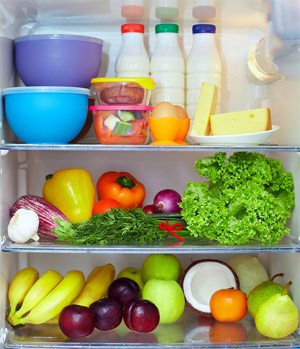
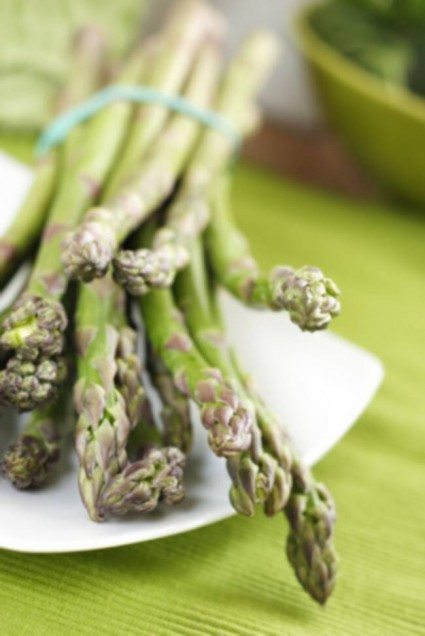
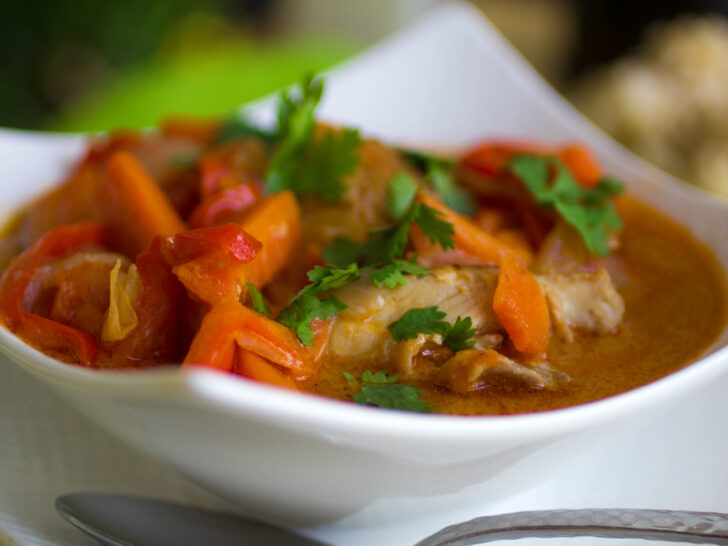
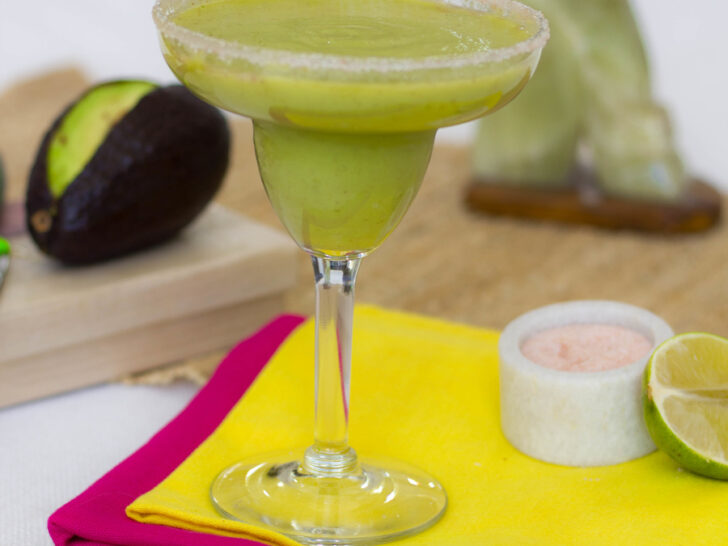
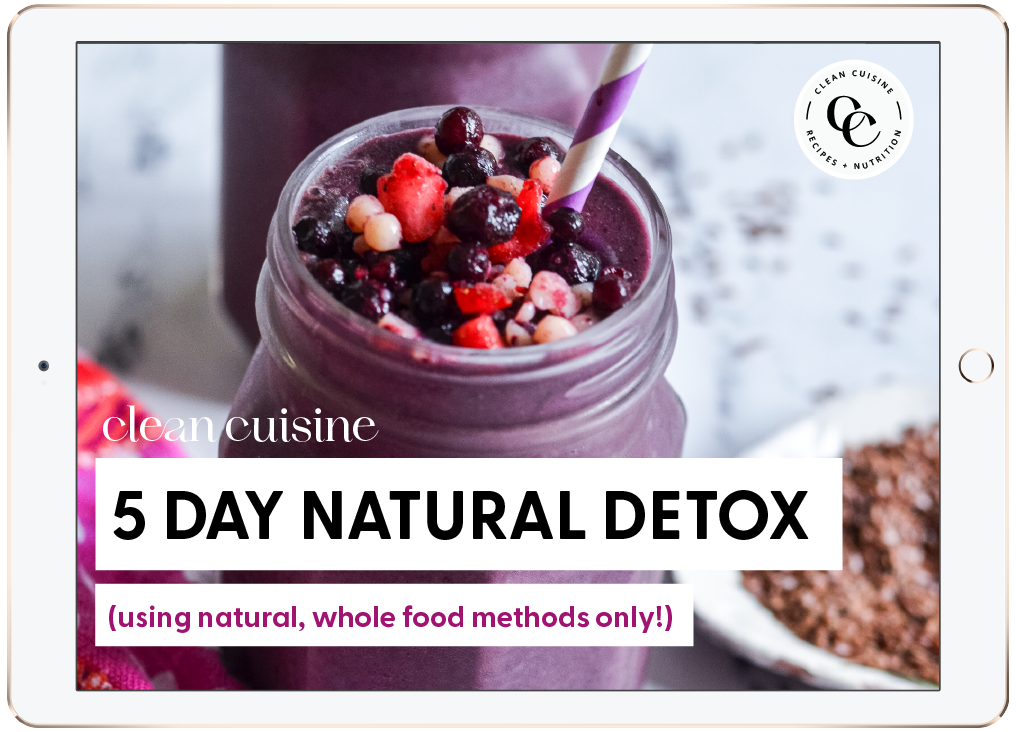
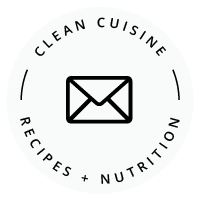
Stephanie Cahill
Thursday 15th of February 2018
I love how you detail the importance of consistency over complication! I wholeheartedly agree. The best kind of foods/meals, I think, are simply prepared with FRESH ingredients. I so look forward to your upcoming cookbook! Long time fan of your work. Stephanie